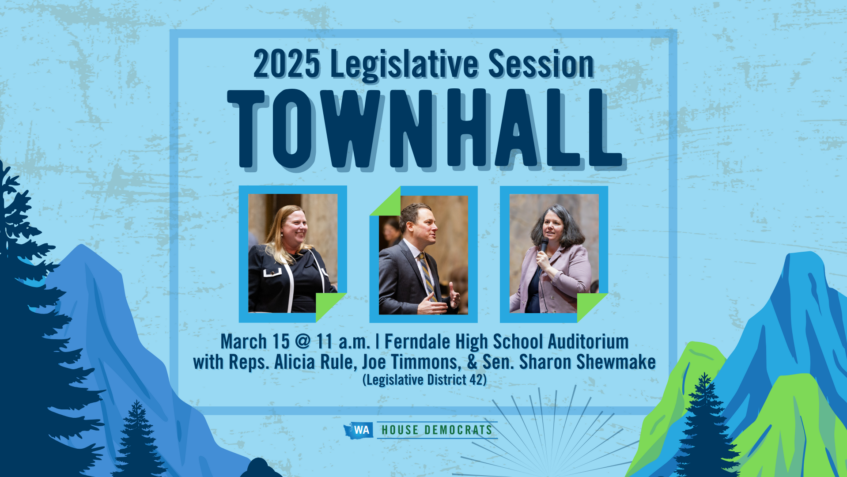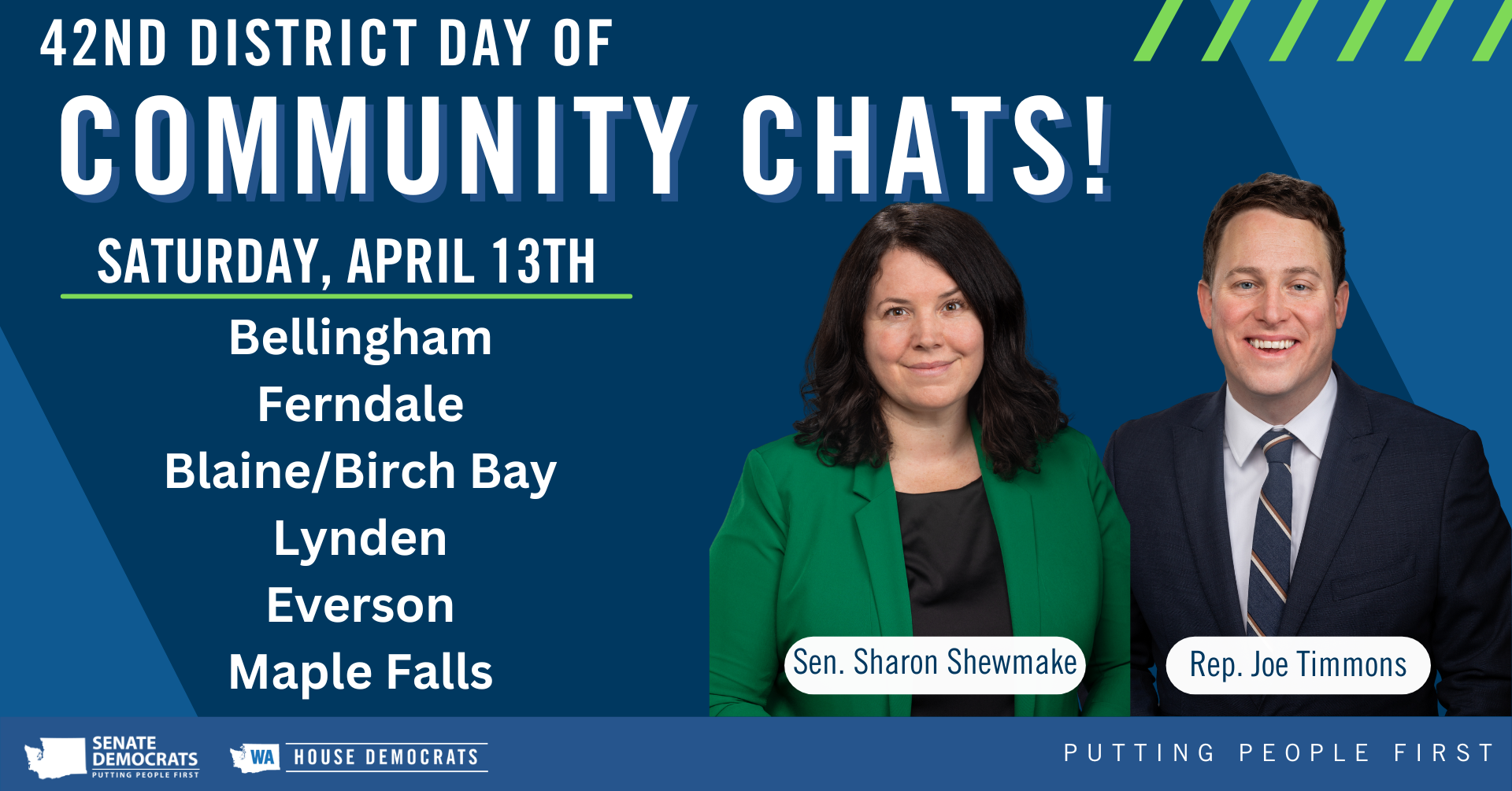Dear Friends and Neighbors,
I am excited to invite you to our 42nd District Legislative town hall at 11 a.m. this Saturday, March 15. The town hall will be held in the Ferndale High School Auditorium. We look forward to hearing your questions and input on the big issues we’re working on this session, like affordable housing, building our green economy, addressing our state’s budget deficit, and education funding.
It is more important than ever that you share your voice. We need to understand what is working or needs changing and how we can make your life better. These conversations help us understand what we can do to make our district, and our state, the best it can be.
We hope to see you there!
WHO: Sen. Sharon Shewmake, Rep. Alicia Rule, Rep. Joe Timmons, and hopefully you!
WHAT: 42nd Legislative District town hall meeting
WHEN: 11 a.m. Saturday, March 15
WHERE: Ferndale High School Auditorium, 5830 Golden Eagle Drive, Ferndale, WA 98565
Submit questions in advance here: https://www.surveymonkey.com/r/Z9NPXBW
If you can’t attend the town hall, you can always reach me at Sharon.Shewmake@leg.wa.gov – I’d be happy to hear from you over email.
The Future of Education Funding
I have heard from MANY of you about better funding our schools and the financial difficulties your districts are facing. A top-notch education is critical for building a robust economy, a functioning democracy, and a bright future for Washington state. My #1 priority this session is to figure out how to better fund our schools, but first, let me explain how education funding works.
How we got here is complicated: the current K-12 funding model, called the “prototypical school funding model,” was created in 2009. The formula ties school funding to the number of students enrolled at that school, using a set of recommended staffing ratios. The state then provides schools funding for materials, supplies, and operating costs (MSOC), special education, transportation and more.
Since the model’s adoption, the Legislature has made several adjustments to how schools are funded. The most significant changes were the result of the state supreme court case, McCleary v. Washington. The 2012 McCleary decision determined Washington was not fulfilling its constitutional obligation to fully fund education. The decision dictated that, while local and federal funding are important elements of school funding, it is up to the state to ensure schools can provide students an adequate education. Our state constitution calls this funding our “paramount duty.”
As a result, the Legislature significantly increased funding per student, passed major reform bills, and eventually, achieved compliance with the McCleary decision in 2018. As a state, we’ve made tremendous progress on education funding. In the past years, we’ve increased education spending by billions of dollars, and Washington has a high average teacher salary.
During the 2023-2025 biennium, we made record investments in critical areas. We increased K-12 funding by $2 billion, thanks in large part to our capital gains tax. We also increased special education funding and set aside more money to hire paraeducators. Per-pupil funding is now higher than ever.
Unfortunately, these historic investments coincided with two major obstacles. The first is the COVID-19 pandemic, which increased student need significantly. As a state, our students still grapple with the learning loss and mental health impacts of the pandemic. Emergency federal funding was temporarily available to help schools meet student needs, but those were one-time payments. The result is higher student need without compensatory funding.
Second, we saw a rise in inflation and the cost of living. Schools are having to spend more on transportation, materials, supplies, and operating costs, and it’s eating into budgets, even as we’ve increased MSOC funding. In some Whatcom County districts, the state funding for MSOC is only half of what the district actually spends. When that happens, the districts have to make cuts elsewhere or rely on local levies.
All of this has coincided with a major budget deficit, but here’s the bottom line: I am 100% dedicated to ensuring we adequately fund public education. It’s not only a constitutional requirement but the right thing to do. In the Senate, we are discussing how to make our tax system fairer and which government agencies and programs can be made more efficient, giving us savings to spend on K-12 education.
Right now, we have two major bills to address education funding. One is SB 5192, which the Senate has passed. It would increase MSOC funding to ensure that we are accurately accounting for the real-world costs districts face to maintain facilities and provide curriculum, so schools aren’t left behind when expenses increase. The bill would also provide districts with more stability by giving them greater control to spend state funding and adjusting the prototypical funding formula to reduce the fiscal impact of sudden student enrollment changes. Schools should be able to focus on supporting students, not scrambling for resources. The other bill, SB 5263, we passed yesterday. It would increase the additional money schools get for students with special education needs, increasing this type of funding by nearly two billion dollars over the next four years.
Crafting the state budget is difficult work even under the best circumstances. Now, it is more important than ever you make your voice heard and let us know which state investments and programs matter to you, your family, and your community.
Keep in Touch!
You can reach me anytime at Sharon.Shewmake@leg.wa.gov.
Sincerely,




